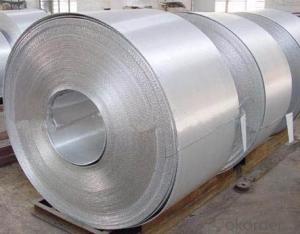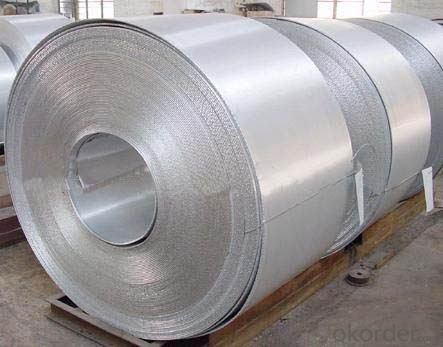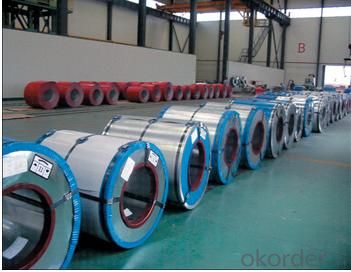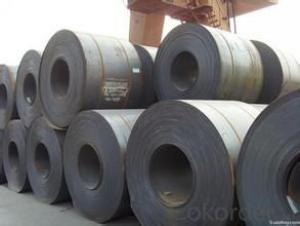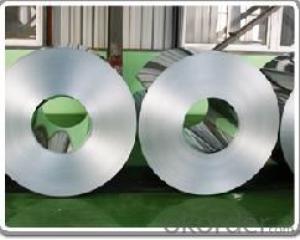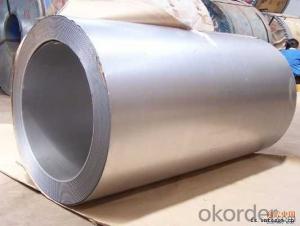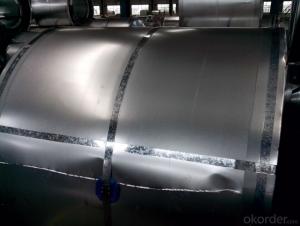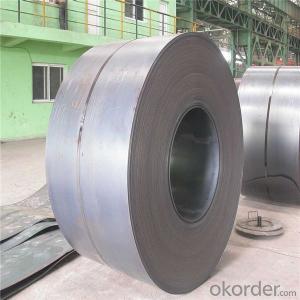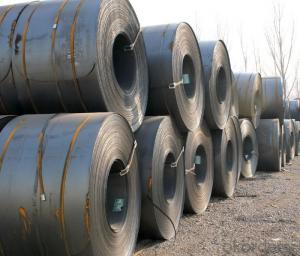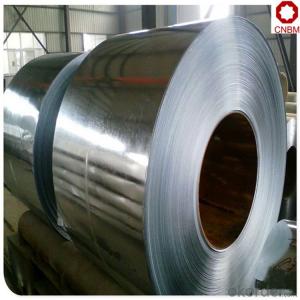Galvalume Steel Coil ,hot dipped 55% AL-ZN Coated Galvalume steel coil
- Loading Port:
- Shanghai
- Payment Terms:
- TT OR LC
- Min Order Qty:
- 25 m.t.
- Supply Capability:
- 100000 m.t./month
OKorder Service Pledge
OKorder Financial Service
You Might Also Like
Specifications
Galvalume steel coils
Min Yield Strength of 550MPA
Min/Regular Spangle
Zinc coating:60-600g/m2
Hot Dipped 55% Aluminum Zinc Alloy Coated Steel by the Hot-Dip Process
Hot Dip Galvalume steel coil EN 10327 JIS G3321, ASTM A792M 55% AL-ZN coated
Description:
The hot dip galvalume steel is a kind of coated steel. With the cold rolled steel of different strength and thickness as substrate, it is produced through applying Al-Zn coat on both faces by hot dip process. In its coating, Al accounts for about 55%, Si 1.6%, while the remaining is Zn. It enjoys both the physical protective feature and durability of Al and the electrochemical protective property of Zn. And its surface has bright silver color and regular embossed-like figure, which are highly decorative.
Comparison
Item | GI | GF(Zn-5%Al) | GALVA-LUME(55%Al-45%Zn) | Al |
Service Life | Fair | Fair | Good | Good |
Electrochemical Protection | Good | Good | Good | N/A |
Welding Performance | Good | Fair | Poor | Poor |
Application with Wet Concrete | Good | Poor | Very Poor | Very Poor |
Thermal Resistance | Poor | Poor | Good | Excellent |
Specifications:
Standard | EN 10327 | DX51D+AZ, DX52D+AZ, DX53D+AZ, |
EN 10326 | SS250GD+AZ, SS350GD+AZ | |
JIS G3321 | SGLCC, SGLCD, SGLCDD, SGLC 400 | |
ASTM A792M | CS type C, CS type B, DS, SS255, SS345 | |
Base Metal | Cold rolled steel coils SPCC, SPCD, SPCE, DC01, DC03, DC04, CS, DS, DDS, Q195, Q250, Q350 | |
Thickness | 0.22mm-2.0mm | |
Width | 700mm-1300mm | |
Coil ID | 508mm, 610mm | |
Zinc coating | 60g/m2-180g/m2 | |
Surface treating | chromium free passivation, chromium passivation, fingerprint resistant, oiled | |
Spangle types | regular spangle | |
Applications:
Architecture | Roofs and outside walls of civilian and industrial buildings, garage doors, fencings and window blinds |
Appliances Industry
| Outer clad sheets for washing machine, refrigerator, television, air conditioner and ventilation system, explosion-proof strip, solar water heater and appliance parts |
Auto Industry
| Muffler, heat shields of exhaust pipe and catalytic converter, auto parts & accessories under the frame, signboard in highway. |
Industrial Instruments
| Electric control cabinet, industrial refrigeration equipment, automatic vending machine |
- Q: Can steel coils be coated with QR codes?
- Yes, steel coils can be coated with QR codes. QR codes can be printed or engraved onto the surface of the steel coils, allowing for easy scanning and identification of the coils.
- Q: i always have eaten rolled oats and i have never tried steel cut oats. what are your opinions on them for oatmeal and which do u like better?
- Steel cut oats take very long to cook. They have a bit more bite to them but the flavor is really the same. It's more a question of which texture you prefer.
- Q: How are steel coils inspected for quality control?
- Steel coils are inspected for quality control through various methods. These methods include visual inspections, dimensional measurements, and non-destructive testing techniques such as ultrasonic testing or magnetic particle inspection. Additionally, the coils are checked for surface defects, such as scratches or corrosion, and are also examined for proper labeling and packaging to ensure they meet the required quality standards.
- Q: How are steel coils used in the production of metal cladding?
- Steel coils are used in the production of metal cladding as a primary raw material. Metal cladding refers to the process of covering a building's exterior with a layer of metal, typically steel, to enhance its durability, aesthetics, and insulation properties. Steel coils serve as the starting point for the manufacturing of metal cladding. These coils are typically made of galvanized steel, which is steel coated with a layer of zinc to protect it from corrosion. The coils are unrolled and fed into a roll-forming machine, where they are shaped into the desired profile for the metal cladding panels. Once the steel coils are formed into the required shape, they undergo various processes to enhance their properties. These processes may include cutting, perforating, and embossing to create patterns, textures, or openings in the cladding panels. The coils can also be coated with additional protective layers, such as paint or powder coating, to provide additional corrosion resistance and aesthetic appeal. The shaped and processed steel coils are then assembled into metal cladding panels. These panels are designed to interlock with each other, creating a seamless and visually appealing exterior for buildings. The panels can be attached to the building's structure using various methods, such as screws, clips, or adhesives. The use of steel coils in metal cladding production offers several advantages. Steel is a strong and durable material, making it suitable for exterior applications that require resistance to weathering, impact, and other environmental factors. Additionally, steel is highly versatile, allowing for a wide range of design options and customization. In conclusion, steel coils play a crucial role in the production of metal cladding. They serve as the raw material, which is shaped, processed, and assembled into panels that provide buildings with enhanced protection, aesthetics, and insulation properties.
- Q: How are steel coils used in the production of HVAC systems?
- Steel coils are used in the production of HVAC systems as a key component in the heat exchange process. They are typically used in the condenser and evaporator coils to transfer heat between the refrigerant and the air. The steel coils provide a durable and efficient surface for heat transfer, ensuring the HVAC system can effectively cool or heat the air.
- Q: Can steel coils be bent or shaped?
- Yes, steel coils can be bent or shaped due to their flexibility and malleability.
- Q: How many millimeters is a number 3 steel crochet hook?
- This depends whether you have a US or a UK pattern. The pre metric UK size 3 was different to the US size 3. Google in compare US/UK crochet hooks and it gives a chart showing the metric/US/UK sizes.
- Q: I feel really stupid asking this question but i feel like a put metal/steel strings on my classical guitar how do you tell the difference?
- Nylon strings are made of nylon; steel strings are made of .... if you put steel strings on your nylon string (classical style) guitar, you will destroy it. The instrument cannot stand up under the tension required for the strings, they will not fit in the saddle properly, they will cut the nut, and your machine heads may break. ... now if you're asking about the three lowest strings, those are metal wound around nylon on a nylon string guitar.
- Q: How are steel coils used in the manufacturing of springs?
- Steel coils are used in the manufacturing of springs by being wound and coiled into a helical shape, providing the necessary strength and flexibility to the springs.
- Q: How are steel coils inspected for camber?
- Steel coils are inspected for camber using various methods to ensure their quality and suitability for further processing. One common method is visual inspection, where trained inspectors examine the coils for any visible signs of camber. They look for any deviation from a perfectly straight surface, such as a bow or a curve, which indicates the presence of camber. Another method involves using specialized equipment like straightedges, measuring tapes, and laser devices. Inspectors place the straightedge along the length of the coil to check for any gaps or spaces between the coil and the straightedge. If there is a significant deviation, it indicates the presence of camber. Measuring tapes are also used to measure the distance between the coil and the straightedge at multiple points along the length of the coil. This allows inspectors to determine the extent of camber and whether it falls within the acceptable tolerance limits. In some cases, laser devices are used to provide a more accurate measurement of camber. These devices emit a laser beam that is reflected off the coil's surface and is then analyzed to determine the presence and magnitude of camber. Additionally, advanced technologies such as computer vision systems and artificial intelligence algorithms are also being employed in the inspection process. These technologies can analyze images or videos of the steel coils and automatically detect any camber, providing accurate and efficient inspection results. Overall, the inspection of steel coils for camber involves a combination of visual inspection, manual measurements using straightedges and measuring tapes, as well as the implementation of advanced technologies. This multi-faceted approach ensures that camber is effectively detected and controlled, thus maintaining the quality and integrity of the steel coils.
Send your message to us
Galvalume Steel Coil ,hot dipped 55% AL-ZN Coated Galvalume steel coil
- Loading Port:
- Shanghai
- Payment Terms:
- TT OR LC
- Min Order Qty:
- 25 m.t.
- Supply Capability:
- 100000 m.t./month
OKorder Service Pledge
OKorder Financial Service
Similar products
Hot products
Hot Searches
Related keywords
